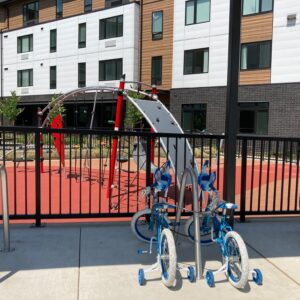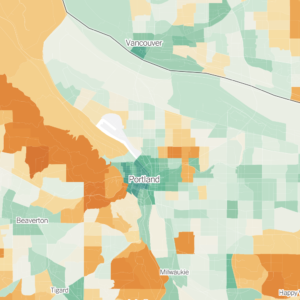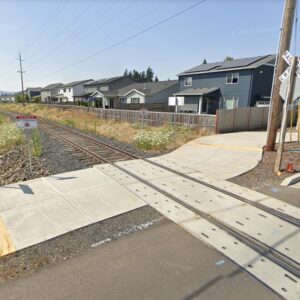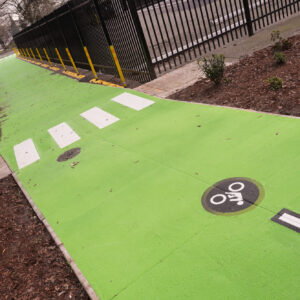
Portland’s bicycling goals are inextricably linked to housing. If we don’t get our land-use right and create smaller circles between where people live and work and shop and play, we will never get over the hump with cycling mode share.
That’s why it came as no surprise that bike advocacy nonprofit BikeLoud PDX co-organized a ride this past weekend with Portland: Neighbors Welcome. The ride was part of the launch of P:NW’s Inner Eastside for All campaign that seeks to “End apartment bans throughout inner Portland neighborhoods.”
That campaign is buoyed by a coalition of over 20 local housing, environmental and transportation nonprofit organizations who signed onto a letter in October to the Portland Planning Commission to influence their thinking on a directive from the State of Oregon to boost housing production.
P:NW wants to re-legalize the fourplexes, apartments and other multi-family dwelling types that were once legal in Portland’s inner neighborhoods until the city updated its Comprehensive Plan in 1980. In a move known as the “Population Strategy” that is now considered part of Portland’s racist planning legacy, city leaders outlawed housing types that they felt were leading to “white flight.” That strategy, “laid out a policy justification for prioritizing middle-class, educated families and wrote policy that favored housing types and neighborhood character that were attractive to those populations at the expense of others. The result was downzoning of inner southeast neighborhoods so that multi-family dwellings were legal only on ribbons of streets adjacent to buy streets.
“This decision helped pave the way to terrible housing shortages and rent hikes, both here and elsewhere in the city, in the 1990s and 2010s,” P:NW says on their campaign website.
The focus of this campaign is from about SE 12th to 60th, and NE Fremont to SE Powell.
P:NW’s vision is to create more walkable neighborhoods with a mix of housing types (including some single-family homes) that are well-served by transit lines and bikeways where you can find bustling commercial centers, corner stores, and public spaces.
The campaign mantra is “Four floors and corner stores!”
“The Inner Eastside is rich in public transit; in walkable, bikeable jobs and services; in mature, beloved street trees,” said Jennifer Shuch, the equitable zoning team lead for P:NW . “Allowing four floors and corner stores to exist anywhere in these neighborhoods is a natural, efficient way for Portland to share those assets while it keeps evolving and growing. We’re urging the city to start exploring the details of such a change.”
On Sunday’s ride, over 40 people showed up for a tour of southeast Portland. “We love policy rides, and this was a very educational experience that included stops throughout inner eastside neighborhoods to discuss the past, present, and future of multi-family housing in this area of the city,” BikeLoud posted on Instagram. “Increasing bicycle ridership will in part depend on the degree to which we build housing in neighborhoods with existing bicycle infrastructure.”
For more information on the campaign, visit PortlandNeighborsWelcome.org.








Thanks for reading.
BikePortland has served this community with independent community journalism since 2005. We rely on subscriptions from readers like you to survive. Your financial support is vital in keeping this valuable resource alive and well.
Please subscribe today to strengthen and expand our work.
Pardon my ignorance, but didn’t we already legalize building more multifamily housing in these neighborhoods? Is there some kind of carve-out for them?
No problem! What the city legalized in 2020 was up to four units on almost all residential lots citywide.
This campaign proposes a bigger change but is more geographically focused: four *floors*, not just four homes; and specifically in these particularly bikeable/walkable/transit-friendly neighborhoods.
https://bikeportland.org/2014/04/23/maybe-this-is-why-you-cant-afford-an-apartment-in-the-central-city-104887
Multifamily up to fourplexes (depending on lot size) was legalized in these neighborhoods by the Residential Infill Project, but because of the very high land values in these areas, spreading out the unit cost over 4 units is not enough to make projects pencil. The units that are being built with the new densities permitted by RIP are happening further out.
Allowing street-scale apartment buildings would make a lot more projects feasible (especially once interest rates go down) and make it possible for people who can’t afford to own a 700k house- the average for the areas we’re talking about- to live in areas they wouldn’t have been able to before. Also notable: affordable housing developers generally can’t build in areas that aren’t zoned for apartments. Folks who live in affordable units, and especially people who are transitioning out of homelessness, are far, far less likely to have cars, and benefit even more by living in transit-accessible, walkable, bikeable neighborhoods.
There are plenty of multifamily zones in inner east Portland, but many neighborhoods still only allow apartments in areas that:
A) had apartments prior to 1980
B) are along a busy road
Portland: Neighbor’s Welcome hopes to lift the ban on apartments in these neighborhoods, so inner east Portland can have more equitable housing types.
In addition to providing density that supports active transport and providing services efficiently, this would also help mitigate the totally insane housing costs.
Too much of Portland is like a gated community without the actual gates.
Why only four floors? Why not six?
https://www.archdaily.com/978264/in-praise-of-5-over-1-buildings
Or why not 4:1 FAR for market rate and up to 12:1 FAR for deeply affordable housing (along with additional bonuses, fee-waivers, tax-abatement, and financing for affordable units). IMO, the lack of any language addressing deep affordability, other than the same-old tired libertarian trickle down-filtering pablum, shows exactly who Portland:Neighbors Welcome really cares about. It’s my guess that P:NW members including Sightline lobbyists and various plugged-in political staff had “conversations” with developers that guided the asks of this anemic campaign. And how the @#$% is it equitable to only fight for upzoning in a tiny sliver of the inner east-side? Apparently, tenants living in less bougie neighborhoods don’t deserve housing choice.
.
I will also note that many prominent YIMBY members of Portland:Neighbors Welcome are constantly posting celebratory images of small condo-ized plexes that have been built on land zoned for apartment buildings (e.g. RM1). Anyone who celebrates use medium-density apartment zoning for ultra-low density plexes is no friend of renters. This also raises the question of why the developers that YIMBYs worship are not building apartment buildings on RM1 and RM2 zoned lots? Could it be that along with exclusionary zoning, developer margin-seeking (greed) and conservatism is also a major problem that could be solved by new regulation and publicly-funded housing?
Why would developers and real estate investors want to minimize their profit by building low margin “affordable” housing that will likely require much more in maintenance costs, given the problems that arise from tenants as the WWeek has published about at several projects over the last few months!?
The developers who develop market rate housing and the developers who develop affordable housing are, for the most part, two entirely different groups. An FAR bonus for affordable housing might make it more likely that a development site gets purchased by an affordable housing developer, but it wouldn’t incentivize a market rate developer to suddenly start building affordable housing.
You (2018-2022): the Residential Infill Project doesn’t go far enough
P:NW (2023): let’s go further than the Residential Infill Project did
You (2023): no, not like that
Stop being dishonest. Above, I voiced support for a FAR of 4 for market rate which is equivalent to the P:NW/Sightline ask. However, if 12:1 FAR for deeply affordable housing is not enough for you, Iain. I’d be fine with 50:1 for deeply affordable.
.
I can’t tell if this is meant to be a joke or you’re actually serious. No one is going to build a building in the inner eastside of Portland at an FAR of 50:1, whether affordable or not; for context, the Empire State Building has an FAR of 32:1. At a certain point you’re just arguing for not having a zoning code.
You got it!
.
I’m arguing that we should not have a zoning code for deeply affordable housing — the only housing subtype that is chronically and persistently under-supplied.
.
And as a I very clearly stated above, I support a city-wide upzone of every single @#$%ing residential lot to at least 4:1 FAR. What I objected to was your orgs choice to limit the benefits of upzoning to a tiny part of bougie Portland.
It’s amazing to me that every time someone mentions some step in the correct direction (legalizing denser housing), you attack it venomously, as being insufficient, some kind of sinister kayfabe, or a mere handout to developers.
Could these more moderate steps, however, just represent the incremental improvements won by a relatively new political coalition, who are wary of blowing their chance at making our laws better and our City better?
Could the fact that P:NW is, in this case, advocating for upzoning this particular area because it avoids politically sensitive areas like Westmoreland or the SW hills? Could they be avoiding a confrontation that risks tanking the whole project?
Would you rather see a more ambitious proposal, even if it meant a greater chance of failure, because the proposal was too fast, too touchy for local elected officials?
It’s clear from a lot of your comments that you’re interested in somewhat revolutionary changes in politics, etc. Would you say that preference is common or uncommon?
I’m just asking you to step outside your own preferences for a second, and ask yourself if it’s better to advocate for this step in the right direction, or to hold out for something truly revolutionary.
Remember that, in holding out, we are guaranteeing more years of housing misery.
How is it equitable? I dunno, maybe residents of less bougie neighborhoods might want the choice to move to a close-in neighborhood with better access to transit, active transportation, and other amenities. And maybe current and future renters would appreciate not having to live on top of a dangerous, noisy, and polluted arterial street.
Interesting mentioning “white flight”, given the black and brown flight from inner Portland of many I’ve talked to now in the Couv, Beaverton, and Clackamas Co. Seems our “BIPoC” neighbors prefer not living in inner PDX admist its transients, rampant theft, and fentanyl junkies despite the flux of “white allies” flying BLM signs and advocating for more bike lanes for them to scoot around Portland in the 48 deg rain. Oh well, guess i better put my rain pants on in case it drizzles on my bike commute to work.
Do you have any support of this claim of “black and brown flight”? I would think what you’re describing is the regular old people being priced out of neighborhoods. Gentrification.
Framing gentrification as “black and brown flight” from inner Portland is extremely disingenuous. Black Portlanders were systematically removed from inner Portland via urban renewal and freeways, and then priced out of Albina starting in the 1990s.
Also, I’m sure you’re talking to tons of of Black people in famously diverse Clackamas county (for the unaware, it was 0.9% Black and 86% White in 2020).
And the systemic racism of landlords, developers, and the real estate industry in general.
.
Rhetorical comment (not directed at blumdrew):
For a group of people* who constantly talk about racist and classist exclusionary zoning, it’s strange how YIMBYs rarely mention that landlords and developers are also a major source of racist and classist exclusion.
Could it be because YIMBY’s are actually closet racists themselves, and their whole project is a kind of shadowy developer/KKK plot to kick people of color out of cities?
Or could it be just because there are already laws on the books regarding housing discrimination, and that’s not central to the main problem YIMBY’s are trying to fix, which, if fixed, would level the playing field between renters and landlords, anyway?
Which explanation is more likely, do you think?
There’s no need to insinuate racism here, when there are perfectly normal reasons for a coalition to focus on the issue it has chosen to address!
So how many people actually realize that more infill = more cars parking on the streets? Now that my neighbors rent out their basement, the renters are constantly parking their cars in front of my driveway, sometimes blocking my trash/compost/recycling cans from the trucks reach, very annoying.
Hey man, progressive policy making isn’t about sound policies. It’s about feeling like one did the right thing. Perhaps there are some problematic unintended consequences BUT we all had good intentions! This is what matters right!?
Please point to even one progressive who has ever said this. Verbatim quotes, no paraphrase.
On the one hand, addressing Portland’s housing shortage could help lift thousands of people out of poverty and homelessness while helping the city deliver services more effectively and sustainably. On the other hand, some privileged homeowners may get annoyed, so it’s impossible to say if it’s good or not.
Just to clarify, do you consider homeowners of all races, genders, class & ages “privileged”? I own a house because I started working in foodservice at age 15 and that’s what I still do at age 48. It’s not like I’m some rich tech bro displacing a working class family. I pay the bills by sweeping, mopping & washing other peoples dirty dishes. Am I privileged just because I’m good at saving money?
Yes, homeowners are privileged by virtue of owning land. You may not be privileged in all aspects of your life, but you certainly are in your home ownership.
The word “privilege” has really lost all meaning.
Privilege:
“a right or immunity granted as a peculiar benefit, advantage, or favor”.
In this case, being a homeowner affords one certain beneficial property rights, other benefits like government financed tax reductions, and advantages such as stability and consistency in direct housing costs (a fixed mortgage).
Being the owner of *anything* affords one certain beneficial property rights. This is my stick, and I have a property right over it that you don’t. Anything that has value can be used to secure a loan. Many things (being married, having kids, attending school, planning to attend school, having medical treatment, retiring, giving money to charity, creating a company, etc.) offer reductions in an already completely artificial system.
When everyone is privileged, no one is privileged.
Thanks for solving all forms of inequality, Watts!
That’s sarcasm. You might be right that privilege doesn’t mean the exact same thing it meant when you were younger, but the word has a ton of meaning, and can be applied with a large degree of nuance over numerous domains.
I offered my stick as collateral and the mortgage officer laughed in my face. How should I proceed in securing a loan?
I can’t imagine why a bank that makes real property specific loans wouldn’t accept your non-real property as collateral.
But if your stick has value, try the pawn shop.
I thought “anything that has value can be used to secure a loan”. As you helpfully pointed out, owning a stick gives me certain benefits, ergo it has value. So how come I can’t get a mortgage with it?
Okay, you got me. You cannot use a stick to secure a mortgage loan (not something I actually said but whatever). I guess claiming homeowners have “privilege” (alongside pretty much everyone else) is a useful concept. Thanks for setting me straight.
Just because you don’t find a concept useful doesn’t mean it has no use, just as the fact that you don’t know the meaning of a word doesn’t mean it has no meaning:
https://en.m.wikipedia.org/wiki/Social_privilege
That wasn’t at all my argument. I was saying that if you assign social privilege to everyone for everything, including accomplishments achieved by a majority of Americans and getting tax breaks, the concept loses value.
Groups that are in the majority are generally able to shape social institutions in ways that privilege themselves over others. Sorry you don’t see any value in such a basic observation.
Besides all the regular benefits afforded homeowners in our society, I’d say you are privileged by having lived in a time and place where you were able to save money and buy a house on foodservice wages. It’s no longer possible for a minimum-wage worker to even afford a one bedroom apartment anywhere in Oregon, let alone a 20% down payment on a house. I assume you also had help with food, lodging, and transportation for part of that time, unless you were completely on your own from the age of 15, which is extremely rare.
You’re correct that banning housing near you is a way to prevent the inconveniences of living near other human beings.
I never said “lets ban housing”, did I? Don’t put words into my mouth. How about we turn every golf course in the city into housing? Plenty of open land out there to be better utilized.
I was just pointing out the irony of people who complain about cars on the road pushing for more cars parking on the street, because that is exactly what happens. I enjoy biking to work, but most Americans are not willing to go without their cars.
What if I told you that the most populous city in the country, which also happens to be the financial center of the world (arguably), and one of the most important cultural institutions America has to offer is a place where 55% of households do not have access to a car. And it’s also a place where 87% of households have access to one or fewer cars!
You are imagining Americans as being singularly car-loving, rather than willing and able to adjust their lives based on the material conditions that they encounter. Increased density and correspondingly scarce parking is a natural mechanism which is likely to cause people to own fewer cars, and people who own fewer cars are more likely to ride a bike or take transit or walk.
Both/and.
I unambiguously support banning development of detached single-unit homes and attached single unit homes.
Yeah, man! Screw grandma! She should live out in the burbs, anyway.
“blocking my trash/compost/recycling cans from the trucks reach”
Just curious if that is a real problem for people. In my neighborhood, parking is tight and there is almost always a car parked in the way of my trash cans, but the trash haulers get them anyway.
Maybe my driver was feeling lazy? I believe there are more than 1 company of trash collectors serving Portland.
How can the car block the cans? Your cans should be in the street. If you have a driveway, your cans should be directly in front of your driveway, where it is illegal to park.
If someone is blocking your driveway, you can call and have the vehicle towed.
A LOT of people realize this, and it is one of the most common complaints from homeowners who would like to ban new people from moving into their neighborhood! Have you ever read an article in one of the neighborhood papers about a new apartment building going in? People complain about losing “their” parking all the freaking time!
Indeed, remember when Mapps campaigned on the idea that East Burnside was *too dense* specifically because it was getting hard to find parking? The cynic in me says he was just pandering to the NIMBY vote and has no firm beliefs about urban planning or anything else for that matter. How very reassuring, I’ll bet.